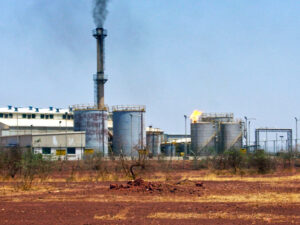Farming in Sudan has become ‘a leap in the dark’
Farmers in Sudan have expressed serious concerns about the agricultural season that is supposed to start this month. The June-to-September main rainfall season is expected to be above average, and flooding is likely to result in crop losses, FEWS NET warns.
 Farmers in Sudan (alaraby.co.uk)
Farmers in Sudan (alaraby.co.uk)
Farmers in Sudan have expressed serious concerns about the agricultural season that is supposed to start this month. The June-to-September main rainfall season is expected to be above average, and flooding is likely to result in crop losses, FEWS NET warns.
The preparations for this year’s main agricultural season do not exceed three percent, Ahmed Babiker, Secretary-General of the El Gezira and El Managil Farmers Association, told the Hadees El Nas programme of the Sudanese Blue Nile Satellite Channel on Tuesday. “Farming now is like taking a leap in the dark”.
Babiker holds the state politics responsible for the dire situation. “Despite the great efforts made by the farmers during the winter season, serious errors made by the transitional government have led to a decrease in wheat productivity.”
Last year, the season turned out to be “a catastrophe” because of “the state’s lack of commitment to set indicative prices for wheat and cotton, maintain irrigation canals, provide the necessary inputs, such as fertilizers, on time”.
The farmers were forced to take loans from the Agricultural Bank to prepare for the last winter season, as the bank's financing of production inputs stopped five years ago, and they did not receive any other state support, he explained.In addition, the government is refusing to buy cotton and wheat, as the farmers earlier this year refused the price of SDG 43.000* set by the Ministry of Agriculture for a 100kg bag of wheat, as the amount did not cover their expenses. “Now the farmers are forced to sell their wheat for less than SDG 30.000.”
'If the situation continues in this way, there will be no cultivation anymore in El Gezira.' – Ahmed Babiker, Secretary-General of the El Gezira and El Managil Farmers Association
Babiker also strongly criticized the lifting of subsidies in the past two years year, as part of the policies of the Ministry of Finance that followed the demands of the World Bank. “The Minister of Finance said at the time that lifting the subsidies would support the inputs – which did not happen. On the contrary, the costs of agriculture rose significantly, leading to a large decrease of the number of cultivated acres.
“If the situation continues in this way, there will be no cultivation anymore in El Gezira. All farmers will migrate to Khartoum to earn a poor living by doing odd jobs and marginal businesses,” he warned, and lamented the fact that the El Gezira Scheme that used to be one of the largest projects in the world irrigated by pumps will end in this way.
Farmer El Jeili El Sheikh confirmed from neighbouring Sennar that the agricultural season during the rainy season last year not only suffered from a lack of rain, but also failed because of the delay in financing and the rise in fuel prices to a “mythical levels” following the lifting of subsidies.
The preparation for the summer season in Sennar is “zero” as a result of the high costs and poor yields in the previous seasons and already largely indebted farmers. “About 90 per cent of the farmers here are insolvent,” he said. El Sheikh himself will not plant this season if diesel is not available and the Agricultural Bank will not have adjusted its debt payments schedule to the current situation.
Urgent intervention needed
Saleh Mohamed Saleh, Director of the Agricultural Bank Finance Department commented that the bank “is based on very solid foundations”. He explained to the Hadees El Nas programme that the capabilities of the Agricultural Bank have decreased because of the continuing high inflation and scarcity of resources. “When the farmers pay off their debts, the value of Pound has significantly decreased. [..] if we lend a farmer an amount to buy a tractor, and agree he will pay back the loan after five years, the same amount will not even buy a tractor wheel anymore.”
The capital of the Agricultural Bank is currently SDG8 billion. The government would pump SDG125 billion into the bank, “but this did not happen because of the weak capabilities of the state”, Saleh said.
The financial expert however sounded optimistic concerning the provision of fertilizers by the Ministry of Finance, and the financing by the government of the summer season.
'About 90 per cent of the farmers in Sennar are insolvent' – Farmer El Jeili El Sheikh
Journalist Ayoub El Sileik, specialised in agricultural affairs, called “all policies of the transitional government” regarding farming “random and confused.
“The yields in the previous seasons were thanks to the farmers and their diligence only,” he said, and also warned for a collapse of farming in Sudan. “And if agriculture collapses, Sudan will collapse.”
El Sileik called for urgent intervention by the Ministry of Finance, that “should buy all the wheat farmers have not sold yet so that they can prepare their lands for the new season. “Agriculture in Sudan is heading towards the abyss, and the state must intervene as soon as possible and support the Agricultural Bank.”
Growing food insecurity
According to the Famine Early Warning Systems Network (FEWS NET), locally produced wheat prices were trading at around 563 SDG/kg in May, which is around 200-250 per cent above the prices of last year and five to seven times above the five-year average.
FEWS NET predicts that between June and September, that large parts of Sudan, mainly in the west, south, and east of the country will reach crisis level. Above average rainfall resulting in heaving flooding can be expected as well. “In agricultural areas, flooding and waterlogging are likely to result in crop losses and reduce agricultural labour opportunities,” the international provider of early warnings on acute food insecurity states.
'More than 18 million Sudanese will face acute hunger by September 2022' – FAO/WFP
The UN Office for the Coordination of Humanitarian Affairs (OCHA) reported in December last year that an estimated 14.3 million Sudanese in the country – 30 per cent of the population – will need humanitarian assistance in 2022. This is a 0.8 million person increase compared to 2021, and the highest number in the past decade.
The UN Food and Agriculture Organisation (FAO) and the World Food Programme (WFP) warned in March that that the combined effects of conflict, economic crisis, and poor harvests are significantly affecting people’s access to food and will likely double the number of people facing acute hunger in Sudan to more than 18 million people by September 2022.
* Yesterday, a US Dollar traded on the parallel forex market for SDG568 whilst the official CBoS exchange rate was roughly SDG446. Early March, the Central Bank of Sudan (CBoS) decided to allow for the determination of currency exchange rates without interference from the Central Bank.











 and then
and then